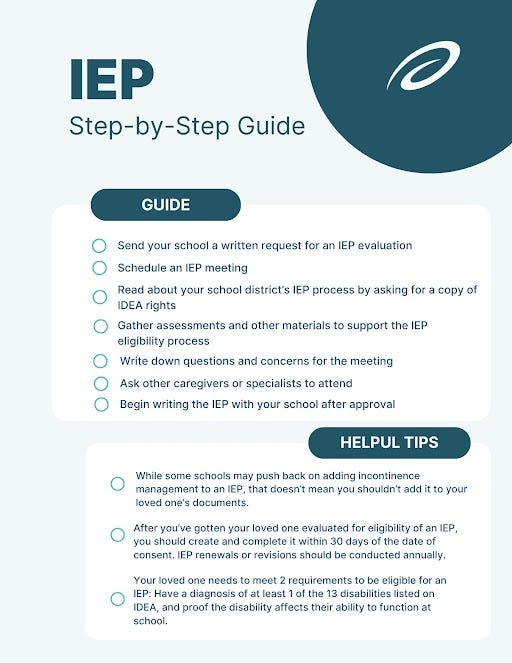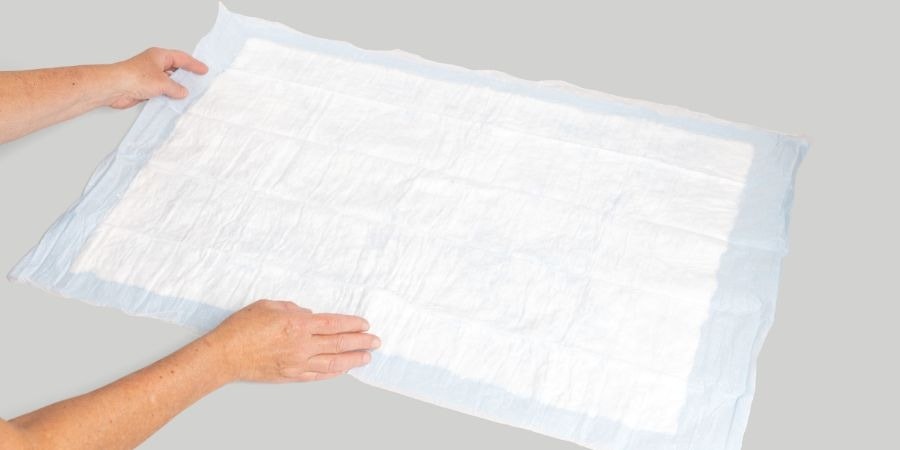Key Takeaways:
- An IEP lays out students' needs, creates learning goals for them, and lists how their school can support and accommodate them.
- IEPs can be made for incontinence and an underlying medical condition.
- If your loved one is not approved for an IEP, you can try getting their school to accommodate them in other ways.
IN THIS ARTICLE:
What Are the Benefits of an IEP?
Can IEPs Be Used for Individuals With Incontinence?
What's the Difference Between an IEP & a 504 Plan?
What Do You Need to Get an IEP?
Step-by-Step Guide to Getting an IEP
INCONTINENCE PRODUCTS THROUGH INSURANCE:
Aeroflow Urology is in-network with many Medicaid and Medicaid-managed insurance plans and is accredited by Medicaid. Complete our Eligibility Form, and we’ll automatically check to see if your plan covers incontinence supplies. ***Must meet certain requirements to qualify.***
You will also receive the care and attention every person managing incontinence deserves: A personalized list of 100% insurance-covered incontinence supplies, a dedicated Continence Care Specialist you can contact during business hours, a user-friendly online portal for easy monthly reordering, and educational content.
Get the continence care you need with the dignity you deserve. Join the Aeroflow Urology family today! It only takes 5 minutes to get started.


Check Your Eligibility
2 Easy Steps
Discover the continence care essentials available through your Medicaid plan.
Managing bladder and bowel conditions isn’t easy for children and teens at school. Help your loved one receive special accommodations to make their learning environment an inclusive and comfortable one with these tips on creating an IEP.
What Is an IEP?
An Individualized Education Program, also called an Individualized Education Plan (IEP), is a legal document used as a guide for students with special needs who receive special education or related services, such as specialized treatment or therapy. The document explains a student's educational needs, creates learning goals for the student, and lists how the school can support and accommodate them, all to meet the child's needs. IEPs can be made by a student's school, healthcare provider, specialist, or caregiver.
A child's IEP consists of:
- Functional performance and academic achievement.
- Measurable academic and functional annual goals.
- Special education services needed in school.
- Supplementary aids needed in school.
What Are the Benefits of an IEP?
Children who struggle with bladder incontinence or fecal encopresis may benefit from an IEP, as the unpredictability of a bladder or bowel accident can impede educational attention and negatively impact socialization. Furthermore, addressing such accidents can interrupt a student's educational environment. Ensuring these conditions and proper requirements to address them, such as needed bathroom access, are protected in your loved one's education through an IEP will likely benefit their overall academic success. Other benefits of having an IEP for your loved one include:
- Allows for special accommodations chosen by the student, caregiver, and others.
- Supports an inclusive learning environment.
- Provides the student with certain rights around school disciplinary practices.
- Monitors academic and personal goals.
- Provides legal protection to the student and their family under special education laws or the Individuals with Disabilities Education Act (IDEA).
- Provides support that's tailored to the student's unique needs.
Can IEPs Be Used for Individuals With Incontinence?
It depends. Your loved one's school may or may not allow for an IEP for incontinence based on their existing medical condition(s) and degree of incontinence. Incontinence can be due to chronic conditions, such as a neurogenic bladder—in which case, this would be expected to make a student eligible for an IEP. However, incontinence may be temporary in other students, and it may be more challenging to obtain an official IEP.
Nonetheless, if your child struggles with incontinence, their healthcare providers should be able to provide documentation allowing for medically necessary accommodations, such as ample bathroom and water access, to which their school should oblige.
What's the Difference Between an IEP & a 504 Plan?
An IEP documents an in-depth school plan for students with disabilities and defines instructions, goals, accommodations, and other services. A 504 plan is less comprehensive, providing inclusive education and accommodations to students with disabilities.
Consider your loved one's specific needs when deciding whether to write an IEP or a 504. At a minimum, for students with incontinence, accommodations to allow them to deal with and address their symptoms should be implemented, and this can be executed with a 504 plan, which is often less strict and easier to obtain compared to an IEP. An IEP is more structured, strict, and closely regulated, and it must be reviewed yearly.
IEPs are more comprehensive than 504 plans, but 504 plans are less strict and easier to obtain.
When Should You Get an IEP?
After you've gotten your loved one evaluated for eligibility for an IEP, you should create and complete it within 30 days of the date of consent. IEP renewals or revisions should be conducted annually.
What Do You Need to Get an IEP?
Your loved one needs to meet 2 requirements to be eligible for an IEP:
- Diagnosis of at least 1 of the 13 disabilities the IDEA considers eligible.
- Proof that the disability affects their ability to learn or function in school.
Additional Information to Gather:
- A private or school-conducted evaluation of your loved one.
- Assessments of your loved one by healthcare providers, specialists, and teachers to show their present levels of performance. These may include interviews, academic assessments, and related service provider assessments.
- Any previous IEP goals and their status.
- An understanding of your loved one's school district's policies and procedures for IEP meetings and documents.
- School documents (tests, progress reports, report cards, etc.).
Remember to include your loved one in the process of creating their IEP. This will ensure they are in control of their school experience and accommodations.
Step-by-Step Guide to Getting an IEP
Follow this guide to completing your loved one's IEP.
- Send your loved one's school a written request for an IEP evaluation.
- Schedule an eligibility meeting with an IEP team. This meeting will include school staff, you, other caregivers, specialists, and your child.
- Read about your school district's IEP process before attending the meeting by asking the school for a copy of the IDEA rights.
- Gather your loved one's assessments and other materials (school tests, report cards, behavioral assessments, etc.) and bring them to the IEP meeting. Create a packet for your loved one that includes information that may help write the IEP guidelines. Include information about your loved one's learning challenges and the special accommodations they require.
- Write down any questions you may want to ask during the meeting and write down all of your top concerns and requests. It may be a good idea to request bathroom access every 2 hours (with no time limitations to allow for proper hygiene / cleanup) or as needed, as well as access to water at all times. You can also request the use of a private bathroom if needed.
- Ask other caregivers or specialists to attend the IEP meeting.
- After your loved one has been approved for an IEP in the meeting, you can begin to write the IEP with the school.
What to Do if Your Loved One Doesn't Qualify for an IEP
If your loved one's school doesn't approve your IEP request, you can:
- Pay for a private evaluation.
- Process a complaint and request a reassessment of your loved one's IEP.
- Try obtaining a 504 plan.
If your loved one's incontinence is affecting their education, don't be afraid to reach out to their school to figure out how to support them best! Minimizing interruption to your loved one's education can help them succeed and remain comfortable and confident in school.
Reference
Harris, K. (2021, October 31). Writing an IEP - A Complete Guide for Teachers. Modern Teacher. https://modernteacher.net/writing-an-iep/#What_is_an_IEP
Disclaimer
Information provided on the Aeroflow Urology blog is not intended as a substitute for medical advice or care. Aeroflow recommends consulting your healthcare provider if you are experiencing medical issues relating to incontinence.













